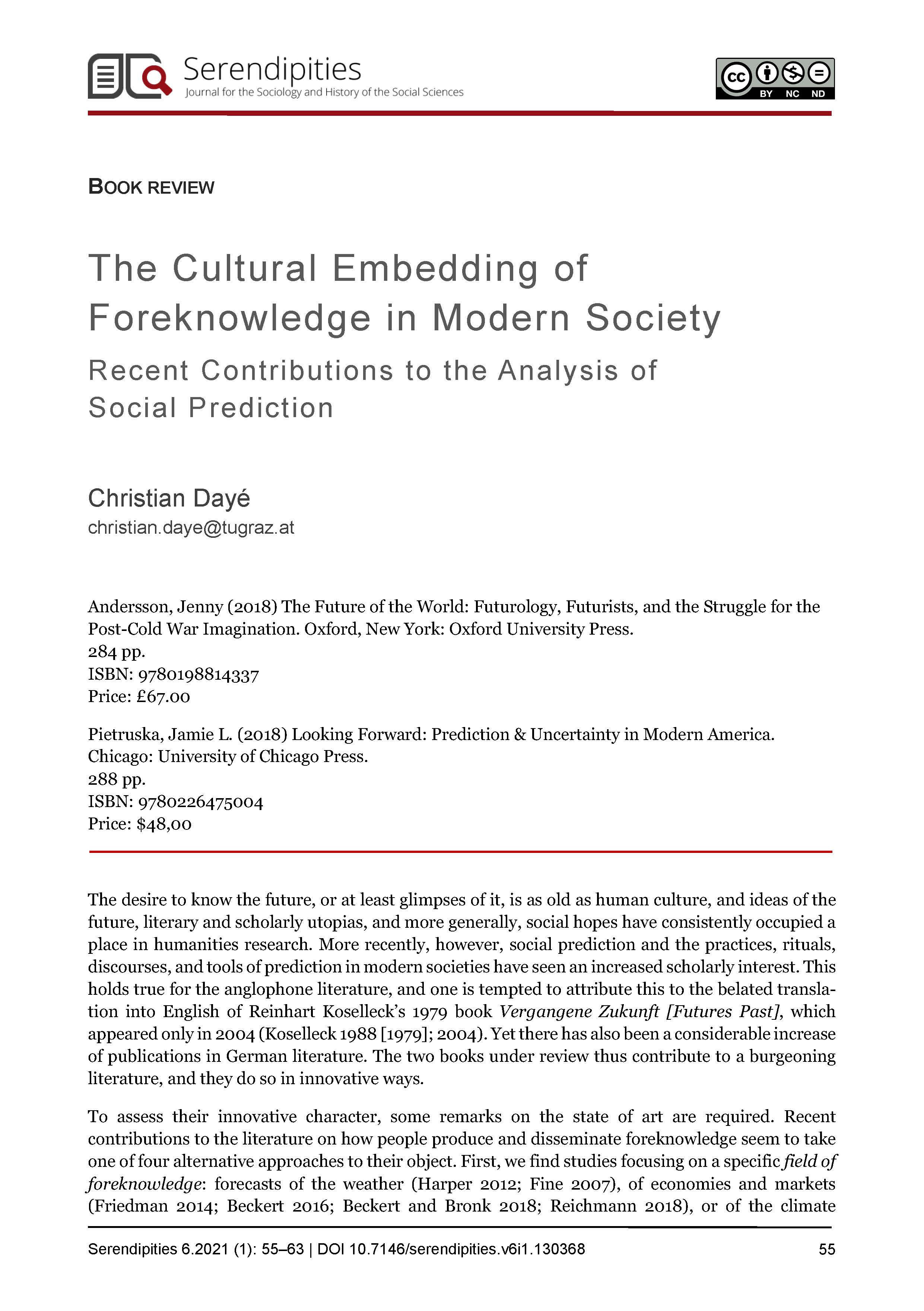The Cultural Embedding of Foreknowledge in Modern Society
Recent Contributions to the Analysis of Social Prediction
DOI:
https://doi.org/10.7146/serendipities.v6i1.130368Keywords:
prediction, prognosis, experts, scientific authorityAbstract
Review essay of:
Andersson, Jenny. The Future of the World: Futurology, Futurists, and the Struggle for the Post-Cold War Imagination. Oxford, New York: Oxford University Press, 2018.
Pietruska, Jamie L. Looking Forward: Prediction & Uncertainty in Modern America. Chicago: University of Chicago Press, 2018.
References
Andersson, Jenny (2018) The Future of the World: Futurology, Futurists, and the Struggle for the Post-Cold War Imagination. Oxford, New York: Oxford University Press.
Andersson, Jenny and Eglė Rindzevičiūtė (Eds.) (2015) The Struggle for the Long-Term in Transnational Science and Politics: Forging the Future. New York, London: Routledge.
Beckert, Jens (2016) Imagined Futures: Fictional Expectations and Capitalist Dynamics. Cambridge (MA), London: Harvard University Press.
Beckert, Jens and Richard Bronk (Eds.) (2018) Uncertain Futures: Imaginaries, Narratives, and Calculation in the Economy. Oxford: Oxford University Press.
Byrne, Peter (2010) The Many Worlds of Hugh Everett III: Multiple Universes, Mutual Assured Destruction, and the Meltdown of a Nuclear Family. Oxford, New York: Oxford University Press.
Colquhoun, Robert (1996) “The Art of Social Conjecture: Remembering Bertrand de Jouvenel.” History of the Human Sciences 9(1): 27–42.
Dalkey, Norman C. and Olaf Helmer (1962) An Experimental Application of the Delphi Method to the Use of Experts. RM-727/1-ABRIDGED. Santa Monica (CA): The RAND Corporation.
Dayé, Christian (2018) “How to Train Your Oracle: The Delphi Method and Its Turbulent Youth in Operations Research and the Policy Sciences.” Social Studies of Science 48(6): 846–68. doi: 10.1177/0306312718798497.
Dayé, Christian (2020) Experts, Social Scientists, and Techniques of Prognosis in Cold War America. Cham, CH: Palgrave Macmillan.
Eberspächer, Achim (2019) Das Projekt Futurologie: Über Zukunft und Fortschritt in der Bundesrepublik 1952-1982. Leiden, Boston: Brill Schöningh.
Fine, Gary Alan (2007) Authors of the Storm: Meteorologists and the Culture of Prediction. Chicago: The University of Chicago Press.
Friedman, Walter A. (2014) Fortune Tellers: The Story of America’s First Economic Forecasters. Princeton, Oxford: Princeton University Press.
Ghamari-Tabrizi, Sharon (2005) The Worlds of Herman Kahn. The Intuitive Science of Thermonuclear War. Cambridge (Mass.), London: Harvard University Press.
Harper, Kristine C. (2012) Weather by the Numbers: The Genesis of Modern Meteorology. Cambridge (MA), London: MIT Press.
Helmer, Olaf and Nicholas Rescher (1959) “On the Epistemology of the Inexact Sciences.” Management Science 6(1): 25–52.
Heymann, Matthias, Gabriele Gramelsberger and Martin Mahony (Eds.) (2017a) Cultures of Prediction in Atmospheric and Climate Science: Epistemic and Cultural Shifts in Computer-Based Modelling and Simulation. Milton Park, New York: Routledge.
Heymann, Matthias, Gabriele Gramelsberger and Martin Mahony (2017b) “Key Characteristics of Cultures of Prediction”, in: Heymann, Matthias, Gabriele Gramelsberger and Martin Mahony (Eds) Cultures of Prediction in Atmospheric and Climate Science: Epistemic and Cultural Shifts in Computer-based Modelling and Simulation, Milton Park, New York: Routledge, 18–41.
Jungk, Robert and Johan Galtung (Eds.) (1969) Mankind 2000. Oslo: Universitetsforlaget.
Keßler, Mario (2007) Ossip K. Flechtheim: politischer Wissenschaftler und Zukunftsdenker (1909-1998). Köln: Böhlau.
Koselleck, Reinhart (1988) Vergangene Zukunft. Zur Semantik geschichtlicher Zeiten. Frankfurt am Main: Suhrkamp.
Koselleck, Reinhart (2004) Futures Past. On the Semantics of Historical Time. Translated and with an Introduction by Keith Tribe. New York: Columbia University Press.
Lepore, Jill (2020) If Then. How the Simulmatics Corporation Invented the Future. New York: Liverlight.
McCray, Patrick (2013) The Visioneers: How a Group of Elite Scientists Pursued Space Colonies, Nanotechnologies, and a Limitless Future. Princeton, Oxford: Princeton University Press.
Meadows, Donella H., Dennis L. Meadows, Jørgen Randers and William W. III Behrens (1972) The Limits to Growth. Signet.
Pietruska, Jamie L. (2018) Looking Forward: Prediction & Uncertainty in Modern America. Chicago: University of Chicago Press.
Reichmann, Werner (2018) Wirtschaftsprognosen. Eine Soziologie des Wissens über die ökonomische Zukunft. Frankfurt am Main, New York: Campus.
Rescher, Nicholas (1997) “H2O: Hempel-Helmer-Oppenheim, An Episode in the History of Scientific Philosophy in the 20th Century.” Philosophy of Science 64(2): 334–360.
Rindzevičiūtė, Eglė (2016) “A Struggle for the Soviet Future: The Birth of Scientific Forecasting in the Soviet Union.” Slavic Review 75(1): 52–76. doi: 10.5612/slavicreview.75.1.52.
Seefried, Elke (2015) Zukünfte. Aufstieg und Krise der Zukunftsforschung 1945-1980. Berlin: Walter de Gruyter.
Tolon, Kaya (2012) “Future Studies: A New Social Science Rooted in Cold War Strategic Thinking”, in: Marc Solovey and Hamilton Cravens (Eds) Cold War Social Science: Knowledge Production, Liberal Democracy, and Human Nature, New York: Palgrave Macmillan, 45–62.
Turner, Fred (2006) From Counterculture to Cyberculture: Stewart Brand, the Whole Earth Network, and the Rise of Digital Utopianism. Chicago, London: The University of Chicago Press.
Wiebe, Robert E. (1967) The Search for Order 1877-1920. New York: Hill and Wang.

Downloads
Published
How to Cite
Issue
Section
License
Copyright (c) 2022 Christian Daye

This work is licensed under a Creative Commons Attribution-NonCommercial-NoDerivatives 4.0 International License.
CC-BY-NC-ND




